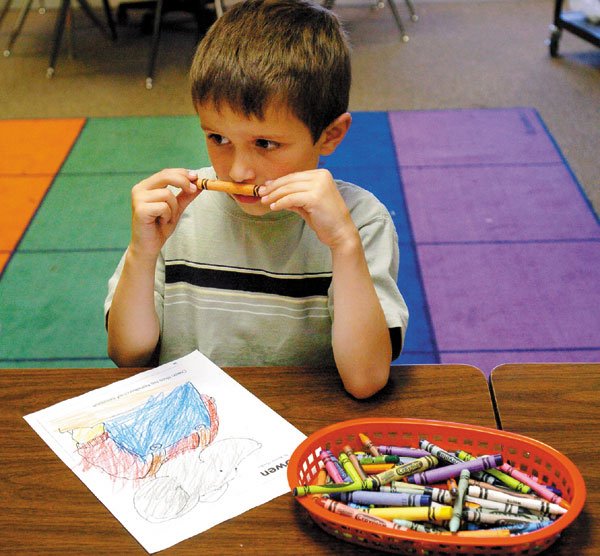Angela Perryman assumed she would have new responsibilities when
her second son was born, but she did not expect translation to be
one of them.
Gilroy – Angela Perryman assumed she would have new responsibilities when her second son was born, but she did not expect translation to be one of them.
“Can I walk on toes?” her now 6-year-old son Connor Perryman asked her as they sat in their garage, the door open, on a clear summer day.
“Yes, you can walk barefoot,” she said to him, ennunciating the words.
“Barefoot,” he repeated as he peeled off his shoes and for several minutes afterward, playing with a plastic triceratops on his tricycle.
Connor Perryman’s tendency to repeat spoken words – known as echolalia – is an outgrowth of his autism, with which he was diagnosed three years ago. He and about 70 other children in Gilroy are living with the disease, which impairs social development. Children with autism – which shows up about age 1 and predominantly affects boys – typically do not recognize facial expressions, develop language on pace with other children, make eye contact or express themselves clearly through words or gestures. Nationwide, autism diagnoses have doubled in the past five years, with about one in 150 children now living with the disease.
The prototypical image of an autistic person is Dustin Hoffman’s character in the 1988-movie “Rainman,” said John Whitney, a Los Gatos pediatrician. However, this does not reflect the variety of people and range of symptoms encompassed by the term of autism.
“It’s a spectrum of disease and development problems that often measures very mild to very severe,” he said.
Connor Perryman’s case is moderate. While he does respond to questions, his responses are brief, quiet and sometimes undecipherable. In addition, he rarely makes eye contact when speaking and is prone to throwing fits when other people touch his toys, especially his train set.
“Life is noisy for Connor,” said Jared Perryman, his 9-year-old brother.
At the mild end of the autism spectrum is 5-year-old J.J. Thomas. He shows typical symptoms of autism, such as an aversion to potty training and obsession with certain foods – his favorite is medium-sized black olive pizzas from Round Table. However, he also enjoys touch and playing with his baby sister, atypical behaviors for autistic children.
Just because a child is labeled autistic does not mean they should be treated identically, Whitney said.
“It’s not like every child with an ear infection who gets antibiotics,” he said. “It’s a multi-focal disease that you have to attack differently in each child.”
A Society Within a Society
Parents of autistic children feel an immediate kinship because the parents are all ambassadors of autism, said Tiffany Thomas, J.J’s mom. One night, parents might have to apologize to a waiter after their child vomits dinner because he does not like the texture of his desert. The next morning, parents might have to explain to a storeowner why their child is opening and closing his hands in self-stimulation as he walks down an aisle, she said.
“We all know what it feels like to be in that position,” she said.
However, strangers are not the only people to whom parents of autistic children must explain autism and the value of treatment. The Perrymans routinely spend two to three times each year justifying speech therapy visits to their health care providers – Signa and the Santa Clara County Individual Practice Association. This is because the association stops paying for the visits two to three times each year, notifying the Perrymans through only a perfunctory, form letter.
“The medical group for some reason is saying it’s not medically necessary,” Angela Perryman said. “And everybody out there is screaming it is.”
With the help of her doctor, she submits stacks of documents and research to the group, who then resumes payment of the visits. However, she shoulders the $135 cost per visit during the month it takes to organize and submit the documents. In the past three years, the Perrymans have shelled out nearly $5,000 for visits that are supposed to be covered.
“It’s wrong to go through that much trouble to get what’s most appropriate for him,” said Tiffany Thomas, who had to fight her insurance carrier to partially reimburse her for the $5,000 she spent to get her son diagnosed with autism.
Not only can parents not depend on insurance companies to fund care for autism, they cannot find consistency among doctors on the cause of autism. While most practitioners and research point to a genetic link, some doctors also believe the disease to be triggered by mercury in a preservative used in vaccines, such as the Measles-Mumps-Rubella shot 1-year-old kids receive.
This lack of consensus leaves Tiffany Thomas feeling helpless about the future of her 9-month-old daughter.
“I’m questioning, should I have her get (the shot),” she said. Yet, “If it’s a genetic thing, then we carry it.”
Worth the Trouble
Despite lingering questions about autism, parents have reached consensus on the challenge of raising autistic kids, who require highly structured days and have difficulty adjusting to deviations in schedules.
“They have to be on such a regimen,” Tiffany Thomas said. “We have to constantly keep them engaged. At the end of the day, I just collapse into my bed.”
To alleviate the pressure, area mothers are organizing a support group, where parents can share advice, discuss emerging research, and create activities aimed at and catered to the special needs of autistic children. The group is not meant as a place to commiserate, Angela Perryman said.
Contrary to popular opinion, parents of autistic children do not feel cursed. An autistic child might take a bit more work than the typical child at times, but they are valued just as highly, she said.
“There’s no way I would trade my son for anything,” she said.














